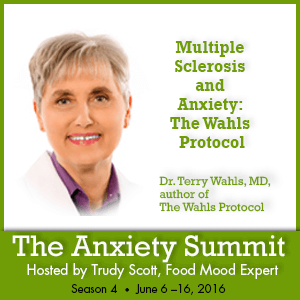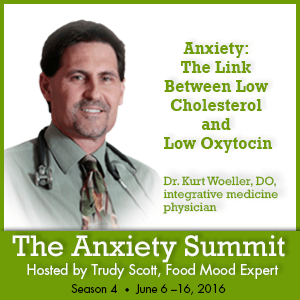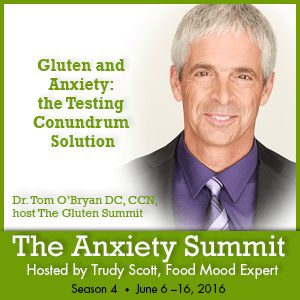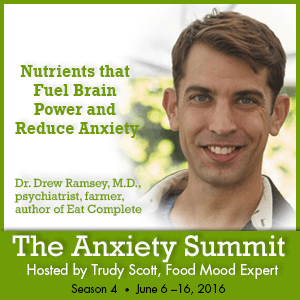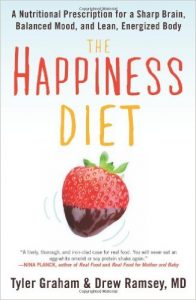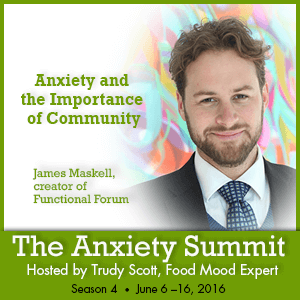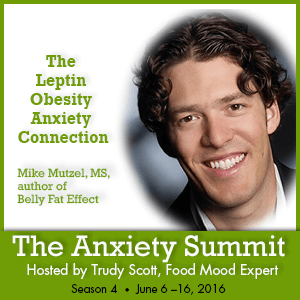
Mike Mutzel, MS, author of Belly Fat Effect, was interviewed on the Anxiety Summit by host of the Anxiety Summit, Trudy Scott, Food Mood Expert and Nutritionist, author of The Antianxiety Food Solution.
The leptin obesity anxiety connection
- Leptin as an appetite-regulation hormone
- How leptin effects on immunity, inflammation and cortisol
- Leptin and the microbiome, LPS and leaky gut
- How leptin plays a role in anxiety, stress, PTSD and depression
- How to exercise, meditate and do yoga to decrease leptin levels
Here are some snippets from our interview:
So low leptin levels trigger the hypothalamus in the brain to signal the rest of the body to initiate hunger and to cause people to eat and so forth. And then as we eat calories throughout the day our leptin levels progressively rise. And once they’re rising, they peak around midnight or two in the morning, it just depends on someone’s biological rhythms. Everyone is different.
And so when they peak that signals to the rest of the body that there’s enough fuel on board and we can start burning fuel. So it’s actually a good process, right, because it’s going to stimulate all these mitochondrial pathways to be turning on basically cellular breakdown of the nutrients that we’ve ingested throughout the day and then the cycle repeats.
The problem though is that people get leptin resistant and this really actually refers to the hypothalamus. So that’s really the main region of the body where the receptors become resistant. And so the problem then because people – and let me just pause and share with you kind of how people get leptin resistant. It’s just leptin is released primarily from adipocytes, from fat tissue, okay. And so the more fat you have, the more body fat you have whether you’re a man or a woman, young or old, the more leptin you’re going to be releasing.
And then we cover leptin 2.0 and the stress, anxiety, PTSD connection:
Now let’s take a deep dive into what I like to call leptin 2.0. The cool part about leptin that not many people understand is that leptin affects the immune system. It also affects the HPA axis and the hormonal system, cortisol and even sex hormones like testosterone and estrogen in a really profound way.
When you become more overweight, more sedentary, you eat outside of your circadian rhythm, leptin levels get imbalanced and you become leptin resistant. Leptin doesn’t have that brake mechanism to suppress cortisol release. That’s why we see elevated levels of leptin in PTSD, in stress responses, in overweight people and so forth. And so it affects our body’s ability to adjust to our environment which is really what we’re trying to do.
We all have stress. We’re just trying to balance that better. The problem though is leptin, if we have excess levels of leptin that’s going to affect our body’s ability to cope with stressors and make life seem more challenging than it needs to be.
Here is the 2015 study I mentioned: The role of maternal obesity in the risk of neuropsychiatric disorders
Animals exposed to maternal obesity and a high fat diet consumption display hyperactivity, impairments in social behavior, increased anxiety-like and depressive-like behaviors, substance addiction, food addiction, and diminished cognition. During development, these offspring are exposed to elevated levels of nutrients (fatty acids, glucose), hormones (leptin, insulin), and inflammatory factors (C-reactive protein, interleukin, and tumor necrosis factor). Such factors appear to permanently change neuroendocrine regulation and brain development in offspring. In addition, inflammation of the offspring brain during gestation impairs the development of neural pathways critical in the regulation of behavior, such as serotoninergic, dopaminergic, and melanocortinergic systems.
Here are some recent studies on leptin, obesity, serotonin and the HPA axis:
- Gastric ghrelin, GOAT, leptin, and leptinR expression as well as peripheral serotonin are dysregulated in humans with obesity
- Neuroendorine and Epigentic Mechanisms Subserving Autonomic Imbalance and HPA Dysfunction in the Metabolic Syndrome
Mike is author of Belly Fat Effect: The Real Secret About How Your Diet, Intestinal Health, and Gut Bacteria Help You Burn Fat
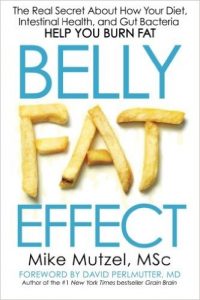 If you enjoy geeky science and plenty of facts you will love this book!
If you enjoy geeky science and plenty of facts you will love this book!
We talked about the excellent Autism Intensive which Mike hosted earlier this year. You can register to watch 5 videos from the event.
And here are some snippets from The Autism Intensive and a snippet of Dr. Usman’s interview: Zinc/copper balance in autism/pyroluria
Here is the gift from Mike: The Leptin Blueprint
If you are not already registered for the Anxiety Summit you can get live access to the speakers of the day here: www.theAnxietySummit.com
Missed this interview or can’t listen live? Or want this and the other great interviews for your learning library? Purchase the MP3s or MP3s + transcripts and listen when it suits you.
You can find your purchasing options here.: Anxiety Summit Season 1, Anxiety Summit Season 2, Anxiety Summit Season 3, and Anxiety Summit Season 4.
